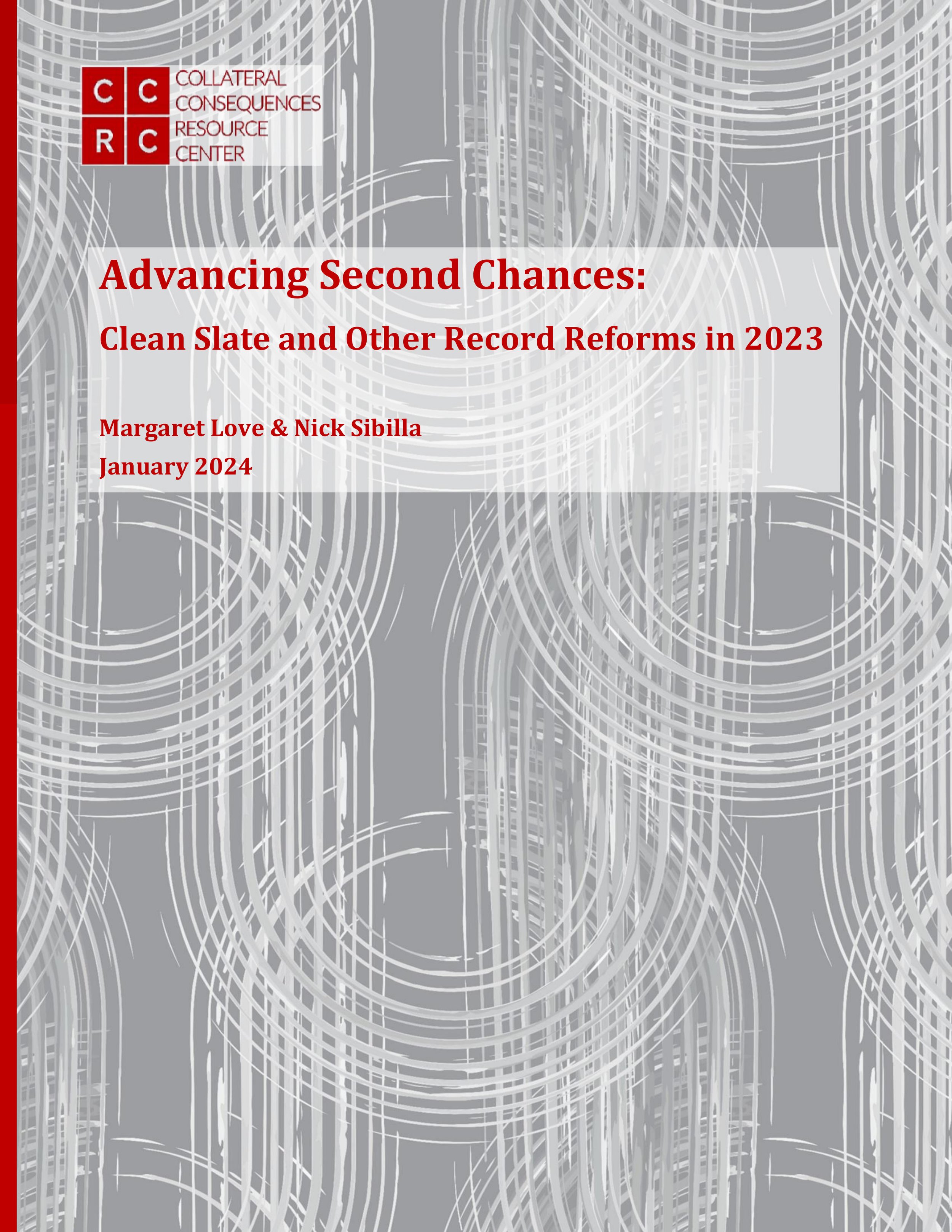By Margaret Love & David Schlussel
Background: This report is the first-ever comprehensive national survey of the period of time a person, who is otherwise eligible to expunge or seal a misdemeanor or felony conviction record, must wait before obtaining this relief. Waiting periods are usually established by statute and can range from 0 to 20 years, a period that typically (though by no means invariably) commences after completion of the court-imposed sentence. Also typically, during a waiting period the person must be free from certain forms of involvement with the justice system: from a felony conviction, from any conviction, or from any arrest, again depending on state law. These and other conditions and circumstances may extend (or occasionally shorten) the length of a waiting period in specific cases.
Contents of the Report: Following this introduction, the report consists of two 50 state Tables, one showing the waiting periods applicable to clearing of misdemeanors, and the other showing the waiting periods applicable to clearing of felonies, with states that have no general record clearing listed at the bottom of each table. The Tables are followed by maps showing the geographical distribution of waiting periods for each type of conviction. The maps are followed by an appendix describing in greater detail the laws governing waiting periods in each of the jurisdictions studied.
Summary of 50-state research results:
The waiting periods for misdemeanor convictions range from a high of 10 or 15 years in Maryland (depending on the nature of the offense) to 0 years in Mississippi (although only first-time offenses are eligible), with most states falling at the lower end of that range. Of the 44 states that authorize clearing of misdemeanor convictions, a near-majority have waiting periods of 3 years or less (19 states) and the vast majority have waiting periods of 5 years or less (35 states).
The waiting periods for felony convictions range from as high as 10 or 20 years in North Carolina to as low as 0-2 years in California, with most states falling at the lower end of that range. Of the 35 states that authorize clearing of felony convictions, a near-majority have waiting periods of 7 years or less (17 states).
Comment on methodology: This report deals only with waiting periods, and only with those applicable to general record clearing of felony and misdemeanor convictions. Different waiting periods may apply to specialized record-clearing programs such as those that apply to victims of human trafficking, decriminalized offenses (e.g., marijuana), and so-called youthful offender programs. It also does not take account of other eligibility requirements that typically apply that could extend the waiting period, including completion of supervision and/or payment of court debt, or potential extensions related to prior, subsequent, and pending criminal matters. It does not consider provisions allowing the DA to consent to shorten waiting periods.
The Tables are based only on the length of the waiting period specified in statute. Insofar as practicable, the charts account for differences in when the waiting period commences (e.g., upon conviction, upon release from incarceration, upon completion of supervision, upon completion of sentence including payment of court debt). Further information about states in the far righthand column of the Tables may be found in the state-specific write-ups in the Appendix or in the state-specific profiles from CCRC’s Restoration of Rights Project.
Considerations for assessing the efficacy of waiting periods: In assessing how waiting periods affect the efficacy of a particular state’s record clearing system, it is important to consider whether some states with shorter waiting periods authorize clearance of a narrower set of convictions, and, conversely, whether some states with longer periods may authorize clearing of a broader set of convictions. In many if not most cases, other variables (including but not limited to those mentioned in the foregoing paragraph) will have to be brought into play to provide a fair assessment.
The changing concept (and length) of waiting periods: Many waiting periods, notably longer ones, reflect a concept of record clearing via expungement or sealing as “recognition of successful rehabilitation and reason to terminate legal disqualifications and disabilities.”1 In recent years, however, many states have shortened waiting periods in recognition of the constructive role that record clearance plays in facilitating reentry and rehabilitation, reasoning that individuals “need the most assistance immediately after release from prison or termination of sentence.”
Since 2016, thirteen (13) states have reduced their waiting periods, four (4) states more than once. The seven (7) states that have enacted a general conviction sealing authority for the first time since 2018 have generally (though not invariably) provided shorter waiting periods than states with more venerable systems.3 States that have reduced their waiting periods in recent years, or enacted new record-clearing laws for the first time, tend to be geographically and politically diverse. The Tables show that the states with the longest waiting periods in the country are on the East Coast, with all but one in the Mid-Atlantic region.
Waiting periods and public safety: Data on recidivism dating from the 1990s reinforced policy arguments that waiting periods should be long enough to reduce the risk of reoffending after record clearance. But new research on recidivism suggests that shorter waiting periods need not raise public safety concerns. Researchers at the RAND Corporation have raised questions about decades of received truth about the prevalence of reoffending after people leave prison, proposing that the majority of individuals with a conviction do not have a subsequent conviction, and that a person’s likelihood of being convicted again declines rapidly as more time passes. This new research would seem to cast doubt on the legitimacy of concerns that shortening waiting periods necessarily raises public safety concerns. Indeed, to the contrary, it suggests that it may be possible to reconcile the seemingly inconsistent policy goals of facilitating and recognizing rehabilitation through shorter waiting periods.
Arnold, MO: Collateral Consequences Resource Center (CCRC) , 2022 23p.




